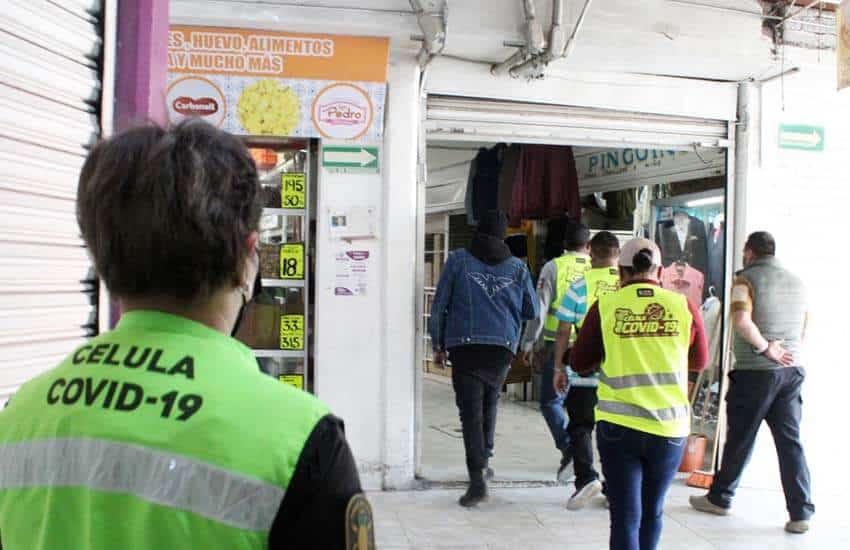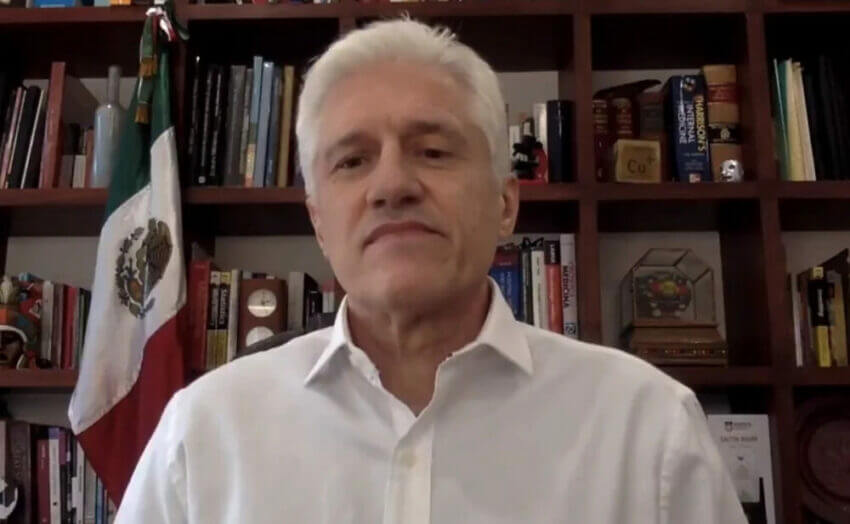The omicron variant of the coronavirus continues to drive daily case numbers to record highs as pressure on Mexico’s health system grows.
The federal Health Ministry reported 47,113 confirmed new cases on Saturday, a figure that broke the single-day record set the day before by almost 3,000 cases or 6%.
An additional 19,132 cases were reported Sunday, leaving Mexico with an accumulated infection tally of 4.36 million and an estimated active case count of 306,389.
The active case tally exceeded 314,000 on Saturday – a new pandemic high – before declining slightly on Sunday, a day on which the number of new infections has been lower throughout the pandemic due to a drop-off in testing and/or the recording and reporting of test results on weekends.
The tally has increased 607% this year after 2021 ended with just over 43,000 estimated active cases. Daily case numbers averaged 24,287 in the first 16 days of January, a 720% increase compared to December.

COVID-19 fatalities remain below December levels for now but hospitalizations are on the rise. The Health Ministry has reported 1,982 deaths to date in January for a daily average of 124, a 26% decline compared to last month.
Daily reported deaths on Friday and Saturday – 195 and 227, respectively – were well above the January average before falling to 76 on Sunday. The official pandemic death toll – which excess mortality data indicates is a significant undercount – rose to 301,410 on Sunday, the fifth highest total in the world.
While evidence shows the omicron strain generally causes less severe illness than that caused by other variants, hospital occupancy levels for COVID patients have nevertheless increased significantly. Thirty percent of general care hospital beds are currently taken, up from 15% in the middle of December, while 17% of those with ventilators are occupied, a five-point jump.
Federal data shows that 113 public hospitals have reached 100% capacity in their general COVID wards, while an additional 38 hospitals have occupancy levels above 70%.
Demand for COVID testing remains high, even though the federal government – which has downplayed the threat omicron poses to people’s health – has advised against getting tested unless there are essential medical reasons to do so.
In other COVID-19 news:
• Mexico City easily has the highest number of estimated active cases with over 68,000 as of Sunday. However, Baja California Sur has the highest number of infections on a per capita basis with about 1,000 per 100,000 people.
Mexico City has close to 800 active cases per 100,000 people while each of San Luis Potosí, Colima and Tabasco has over 400.
At the other end of the scale is Chiapas, where the number of active cases per 100,000 people barely registers on the Health Ministry’s latest graph.
• Contrary to the federal government’s assertions, omicron can cause serious illness, says a virologist and researcher at the Autonomous University of San Luis Potosí.
“We have to stop playing down [the variant], like the federal government, which says omicron is a little flu,” said Andreu Comas García. “… We know that it’s a virus that affects the whole body,” he added.
President López Obrador, who tested positive a week ago but returned to his regular news conference on Monday, described omicron as “un covidcito” or “a little COVID,” while Deputy Health Minister Hugo López-Gatell compared the virus to the common cold.

• The omicron-fueled surge in cases is the “last swipe of the pandemic’s tail,” infectious disease specialist Alejandro Macías said in a radio interview.
He predicted that case numbers will continue to increase for the next two to three weeks before starting to decline.
“Let’s get through another three weeks, and I think we’re going to emerge to a much more controllable situation,” Macías said, explaining that his prediction was based on what happened in South Africa, where the omicron-fueled wave has now receded.
The doctor, the federal government’s influenza czar during the swine flu pandemic, predicted last Tuesday that half of Mexico’s population will contract omicron in the coming weeks.
“COVID-19: an infectious disease had never spread with the speed that omicron is spreading. At this rate … half the population will be infected in the following weeks,” Macías wrote on Twitter.
He tweeted another prediction on Monday morning: “Of course we can be optimistic for 2022: the COVID pandemic could reach its endemic phase. But those who think the omicron variant is a little cold are mistaken. There will still be more cases and more deaths. Hospitals and intensive care units will still fill up.”
• Enrique Ruelas, director of the International Institute for Health Futures, a think tank, warned that the fourth wave of infections is placing additional pressure on health workers who are already exhausted after treating COVID patients for almost two years.
“It’s an enormous amount of time [to be under intense pressure], … the exhaustion accumulates, [and] the consequence of this is not just for health personnel but patients as well. It’s … proven that the number of mistakes committed when looking after patients increases in proportion to the tiredness of the personnel providing the care,” he said.
In addition, coronavirus infections among health workers are depleting workforces, placing even more pressure on those who remain on the job.
• Authorities in Orizaba, a magical town in Veracruz, have made the use of face masks mandatory in public places. The rule took effect Saturday with non-compliance punishable with a fine of 864 pesos (US $42). However, scofflaws are supposed to be given two warnings before they incur a fine.
The rule is slated to remain in effect until February 15.
• Authorities in Ecatepec, México state, made masks mandatory last week, and a 29-year-old man last Friday became the first person to be detained for non-compliance. Javier N. was jailed for eight hours for not wearing a mask in the street.

According to the newspaper El Financiero, the man received a warning for not wearing a mask and subsequently put one on. However, he removed it a short time later, prompting municipal officers to detain him.
With reports from El País, El Universal, Reforma, Milenio and El Financiero
